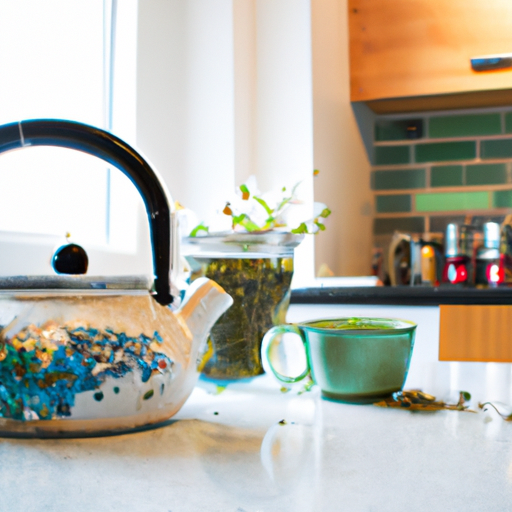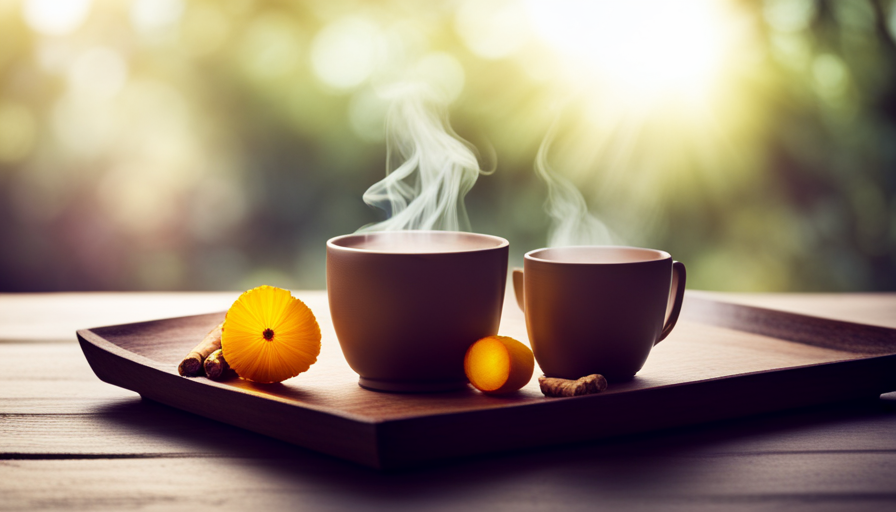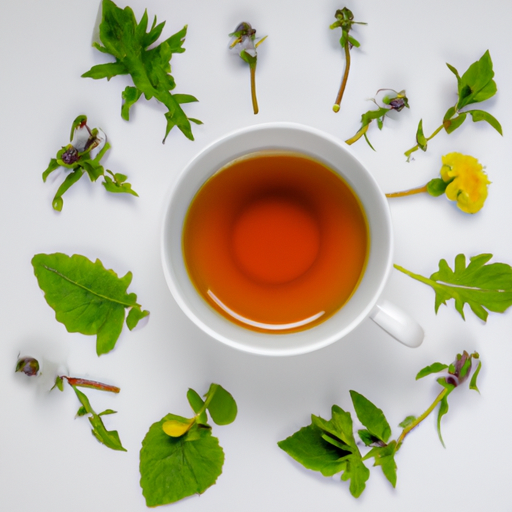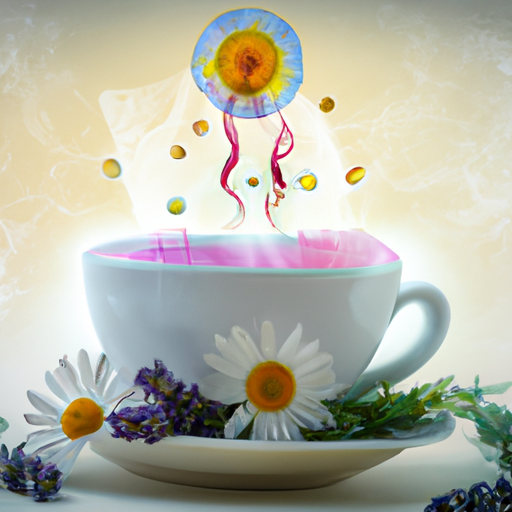Imagine this: you’re at your desk, attempting to concentrate on your tasks, when all of a sudden, your stomach begins to churn and twist. The discomfort is overwhelming, and you frantically look for a way to alleviate the pain.
In times like these, herbal tea can be your saving grace. Herbal tea has been used for centuries to alleviate various ailments, including upset stomachs. Packed with natural ingredients and soothing properties, these teas provide relief and promote digestive health.
But with so many options available, which herbal tea should you choose? Allow me to be your guide in this journey towards a healthier stomach. In this article, I will introduce you to the top herbal teas that are known to calm upset stomachs. From the gentle and soothing chamomile tea to the invigorating ginger tea, we will explore the benefits and evidence behind each herbal remedy.
So, if you’re ready to discover the power of herbal teas and find the perfect blend for your upset stomach, let’s dive in and explore the wonders of nature’s healing brews.
Key Takeaways
- Chamomile tea is known for its calming and anti-inflammatory properties, making it a suitable choice for soothing an upset stomach.
- Peppermint tea can help relax the muscles of the gastrointestinal tract, reducing symptoms of indigestion like bloating and gas, as well as alleviate stomach cramps and reduce nausea.
- Ginger tea is soothing to the stomach, can reduce nausea, and alleviate indigestion. It also has anti-inflammatory properties.
- Fennel tea can alleviate digestive discomfort, reduce bloating, gas, and cramps, stimulate the production of digestive enzymes, and relieve symptoms of indigestion such as heartburn and acid reflux.
Chamomile Tea
If you’re looking for a herbal tea to soothe your upset stomach, chamomile tea is a fantastic choice. Chamomile tea has been used for centuries for its numerous health benefits. It’s known for its calming and anti-inflammatory properties, which can help ease stomach discomfort and promote digestion. Chamomile tea is also rich in antioxidants, such as apigenin, which can help reduce inflammation and protect against certain diseases.
To make a cup of chamomile tea, simply steep a chamomile tea bag in hot water for about 5 minutes. You can also add a teaspoon of honey for added sweetness and additional soothing effects.
Chamomile tea is a great option for relieving an upset stomach. Now, let’s move on to the next herbal tea, peppermint tea.
Peppermint Tea
Peppermint is a great option to soothe an unhappy tummy. It not only has a refreshing taste but also offers several benefits for digestion.
Here are some of the benefits of peppermint tea:
-
Relieves indigestion: Peppermint tea can help relax the muscles of the gastrointestinal tract, reducing symptoms of indigestion like bloating and gas.
-
Eases stomach cramps: The antispasmodic properties of peppermint can help alleviate stomach cramps and spasms.
-
Reduces nausea: Peppermint tea has a calming effect on the stomach, making it useful for relieving nausea.
-
Supports digestion: Peppermint tea can stimulate the flow of bile, aiding in digestion.
To make peppermint tea, simply steep 1 teaspoon of dried peppermint leaves in a cup of hot water for 5-10 minutes. You can also add honey or lemon for added flavor.
Transitioning to ginger tea, another great option for upset stomachs, it’s known for its soothing properties.
Ginger Tea
Ginger tea, with its warming and comforting qualities, is a delightful option to soothe digestive discomfort. It’s not only soothing to the stomach, but it also offers numerous health benefits. Ginger tea is known for its ability to reduce nausea and alleviate indigestion. It contains compounds called gingerols and shogaols, which have anti-inflammatory properties that can help calm an upset stomach. To make ginger tea, simply steep a few slices of fresh ginger in hot water for about 10 minutes. You can also add a squeeze of lemon or a teaspoon of honey for added flavor.
Now, let’s move on to fennel tea, another herbal remedy that can provide relief for an upset stomach.
Fennel Tea
Fennel tea can be a soothing and flavorful option to alleviate digestive discomfort. This herbal tea has been used for centuries to aid digestion and promote overall gut health.
Fennel tea is made from the seeds of the fennel plant, which contain compounds that’ve been shown to have anti-inflammatory and carminative properties. These properties help to relax the muscles in the gastrointestinal tract, reducing bloating, gas, and cramps.
Fennel tea is also known to stimulate the production of digestive enzymes, which can improve digestion and absorption of nutrients. Additionally, fennel tea has been used to relieve symptoms of indigestion, such as heartburn and acid reflux.
Overall, fennel tea is a natural and effective option for promoting healthy digestion. Speaking of digestive benefits, let’s move on to the next herbal tea, licorice root tea.
Licorice Root Tea
Licorice root tea, with its sweet and earthy flavor, offers a soothing and calming effect on the digestive system. It has been used for centuries in traditional medicine to alleviate various stomach ailments, including upset stomach, indigestion, and heartburn. Licorice root contains compounds that have anti-inflammatory and antioxidant properties, which can help reduce inflammation and protect the stomach lining. Additionally, licorice root is known to stimulate the production of mucus in the stomach, providing a protective barrier against stomach acid. However, it is important to note that licorice root should be consumed in moderation, as excessive intake may lead to side effects such as high blood pressure and low potassium levels. As we move on to the next section about lemon balm tea, we will explore another herbal remedy for soothing an upset stomach.
Lemon Balm Tea
Lemon balm tea is a wonderful herbal remedy for calming an upset stomach and reducing nausea. It contains compounds that can help soothe the digestive system and ease discomfort. Additionally, lemon balm tea is known for its ability to promote relaxation and reduce stress, making it a great choice for those experiencing stomach issues due to anxiety or tension.
I often recommend sipping on a warm cup of lemon balm tea to my clients who’re looking for a natural and holistic way to find relief for their upset stomach.
Calm an Upset Stomach and Reduce Nausea
Chamomile tea can work wonders in soothing an upset stomach and easing feelings of nausea. When it comes to herbal remedies for indigestion and natural ways to soothe stomach discomfort, chamomile tea is a top choice.
This gentle and aromatic tea contains compounds that’ve been shown to relax the muscles in the digestive tract, reducing cramping and promoting healthy digestion. Chamomile also has anti-inflammatory properties that can help to reduce inflammation in the stomach lining, relieving discomfort and pain.
Additionally, chamomile tea’s been found to have a calming effect on the body, which can help to promote relaxation and reduce stress.
So, if you’re looking for a natural remedy to calm your upset stomach and reduce nausea, reach for a cup of chamomile tea.
Promote Relaxation and Reduce Stress
Soothe your stress and find serenity with a simple sip of lavender-infused liquid. Lavender tea has been used for centuries to promote relaxation and reduce stress. Not only does it have a calming effect on the mind and body, but it also has properties that can promote sleep and improve digestion.
Research has shown that lavender can reduce anxiety and enhance mood, making it the perfect herbal tea for those looking to unwind after a long day. But lavender is not the only herbal remedy that can help with stress and digestion.
In the next section, we’ll explore the benefits of a peppermint and chamomile blend, another soothing tea that can provide relief for an upset stomach.
Peppermint and Chamomile Blend
If you’re feeling bloated and uncomfortable, why not try a delicious and soothing blend of peppermint and chamomile tea to calm your upset stomach? Peppermint has long been used for its digestive benefits, as it can help relax the muscles of the gastrointestinal tract, reducing symptoms of indigestion and bloating. It also has antimicrobial properties that can help soothe an irritated stomach. Chamomile, on the other hand, is known for its calming effects on the body and mind. It can help reduce stress and promote relaxation, which can be beneficial for those experiencing stomach discomfort due to anxiety or tension. Combining these two herbal powerhouses creates a potent blend that not only tastes great but also provides relief for your upset stomach.
| Peppermint Benefits | Chamomile Benefits |
|---|---|
| Relieves indigestion | Reduces stress |
| Alleviates bloating | Promotes relaxation |
| Soothes stomach | Calms anxiety |
| Has antimicrobial properties | Supports digestion |
Frequently Asked Questions
Can I drink chamomile tea if I have a ragweed allergy?
Chamomile tea may not be suitable for those with ragweed allergies. About 90% of people with ragweed allergies also react to chamomile due to cross-reactivity. However, there are other herbal teas that can help with stomach upset.
How long should I steep peppermint tea for maximum benefits?
For maximum benefits, steep peppermint tea for 5-10 minutes. Peppermint tea aids digestion by relaxing the muscles of the gastrointestinal tract and reducing symptoms like bloating and stomach discomfort.
Is ginger tea safe to consume during pregnancy?
During pregnancy, it’s generally safe to consume ginger tea in moderation. It can help with morning sickness and digestive issues. Try a simple recipe: steep fresh ginger slices in hot water for 10 minutes. Enjoy the soothing benefits!
Can fennel tea be used to relieve bloating and gas in infants?
Yes, fennel tea can be helpful in relieving bloating and gas in infants. It has been traditionally used for colic and aids digestion. However, it’s important to consult with a pediatrician before giving it to your baby.
Are there any potential side effects of consuming licorice root tea regularly?
Regular consumption of licorice root tea may have potential risks and long-term effects. It’s important to be aware of possible side effects such as high blood pressure and mineral imbalances. Consulting a healthcare professional is advisable.
Conclusion
In conclusion, herbal teas can be a soothing and natural remedy for an upset stomach. Chamomile tea is known for its calming properties, while peppermint tea can help ease nausea and improve digestion. Ginger tea is great for relieving stomach aches and reducing inflammation.
Fennel tea can help with bloating and indigestion, while licorice root tea can soothe an irritated stomach. Lemon balm tea can also help with digestive issues and promote relaxation. A blend of peppermint and chamomile can provide a powerful combination of stomach-soothing benefits.
As the saying goes, "An ounce of prevention is worth a pound of cure," so why not try incorporating these herbal teas into your daily routine to keep your stomach happy and healthy?










